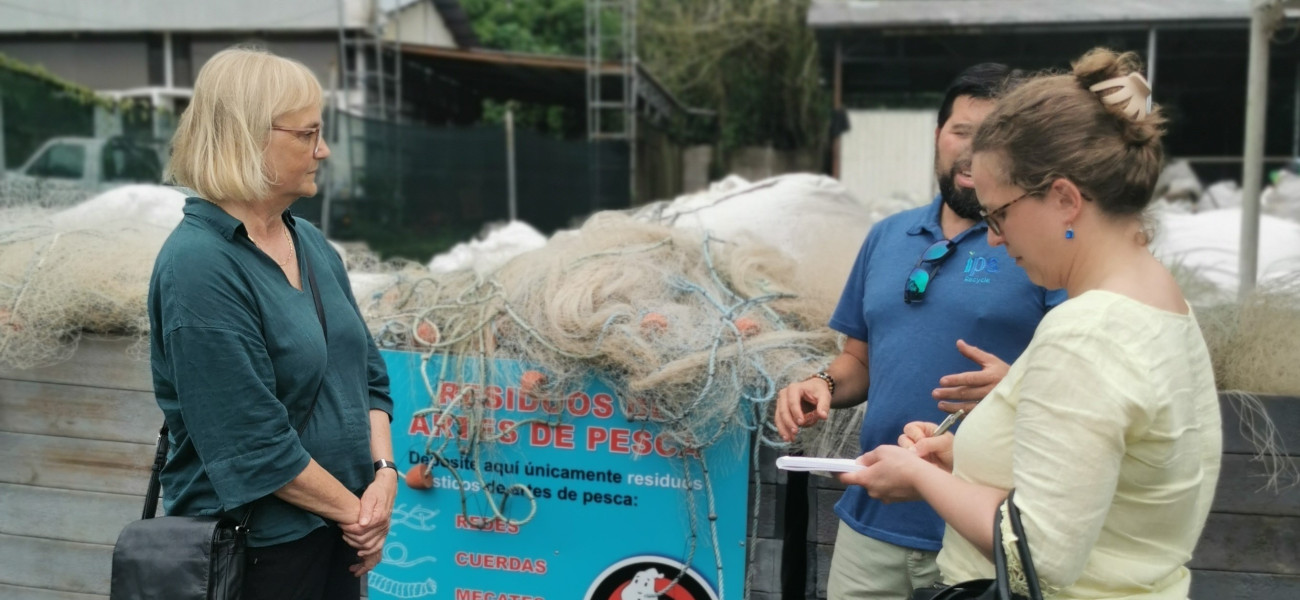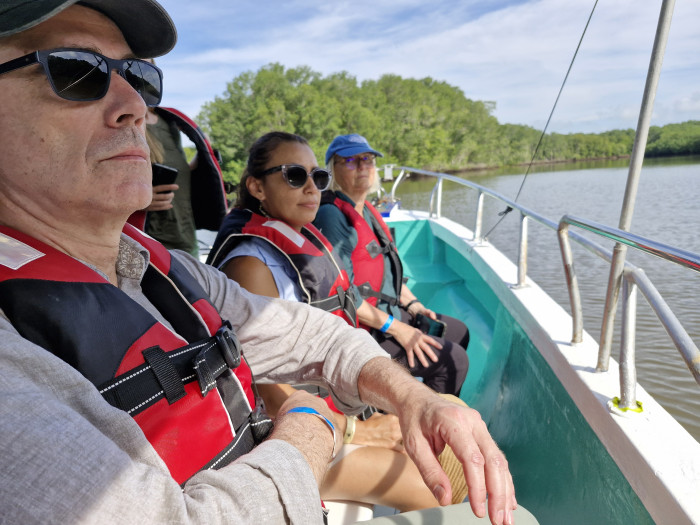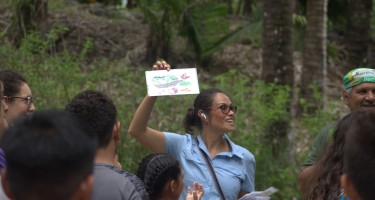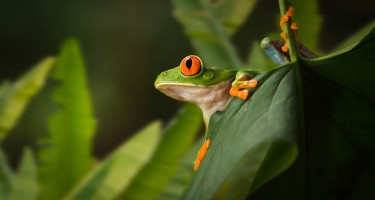Parliamentary State Secretary of BMUV visits Costa Rica to strengthen efforts on mangroves and against ghost fishing
In the framework of the third UN Ocean Conference, Ms. Bettina Hoffmann, Deputy Minister of the German Federal Ministry for the Environment, Nature Conservation, Nuclear Safety and Consumer Protection (BMUV), visited Costa Rica and participated in the High Level Event on Ocean Action: Immersed in Change, in San José.

Visit of Mrs. Hoffmann to the fishing nets collection center. © ACCIÓN Clima / GIZ Centroamérica
GIZ Costa Rica carried out a field tour for the German delegation, including Ms. Hoffmann, and the German Ambassador in Costa Rica, Mr. Daniel Kriener, to learn about the actions that national stakeholders are implementing in the Gulf of Nicoya.
The main focus of the tour was ghost fishing, an activity that generates related waste, such as fishing nets. These represent up to 50% of the plastics in the sea in the country, and have a serious impact on fish, birds and marine mammals that get “trapped” in them.
This issue was prioritized at the High Level event, and will also be addressed by the International Climate Initiative (IKI) for Costa Rica, Central America and the Caribbean; ACCIÓN Clima project, to expand and scale up existing efforts with local stakeholders.
During the tour, the German delegation visited the mangroves of Puntarenas, to learn about the efforts to conserve and restore these important ecosystems, supported by IKI through the Transforma-INNOVA project. Implemented by Conservation International and GIZ.
Tour itinerary
- The mangroves of Puntarenas
As the first item on the agenda, the delegation visited the work carried out by Conservation International together with the Pitahaya Integral Development Association and the National Wetlands Program of the Ministry of Environment and Energy (MINAE) for the restoration of mangroves.
There, they discussed the ecological importance of mangroves as nurseries for commercially valuable fish, their role in filtering pollutants, for protection against storms and floods, as well as their relevance for local communities that, following a management plan, are dedicated to the extraction of mollusks.
Visitors were told that in recent decades, mangrove populations have declined considerably due to agricultural and aquaculture practices and environmental pollution.
For this reason, MINAE has declared mangrove protection a national priority and is working with Transforma-Innova to reforest the area as part of restoration efforts.
- Coast Guard Collection Center
The tour continued to the “ghost nets” reception point, managed by the National Coast Guard Service, which works on the collection of these nets by sea and land, a critical threat to the inhabitants of the marine-coastal areas.
75% of what is collected is debris from ghost fishing and the remaining 25% corresponds to nets seized by the Coast Guard.
Ninety percent of Costa Rica's territory is marine, providing important habitats, migratory routes, and nesting sites for marine animals such as turtles and whales. Hence the importance of initiatives to reduce impacts on marine biodiversity, such as training for artisanal fishermen.
A first important step was taken in 2021 with IKI funding through GIZ and the local organization Asociación Centroamericana para la Economía, Salud y el Ambiente (ACEPESA), which developed an inventory of marine debris in the South Pacific of the country, from which recommendations were formulated to address the problem.
According to ACEPESA, the situation identified in the South Pacific coincides with what has been observed in the Central Pacific, where the first efforts to manage ghost fishing are currently underway.
The Minister of Fisheries and Blue Economy of the Republic of Madagascar, Mr. Tsimanaoraty Paubert Mahatante, and the Minister of Fisheries and Aquaculture of Costa Rica, Mr. Heiner Méndez Barrientos, also participated in this activity.

Mrs. Hoffmann alongside the German Ambassador in San José, Mr. Daniel Kriener, and the biodiversity advisor for the ACCIÓN Clima project, Catalina Molina Bustamante. © GIZ Centroamérica
- Visit to IPS Recycle
The last location of the tour was the IPS Recycle company, which, with a pioneering circular economy initiative, transforms fishing nets and other plastic waste into new recycled materials.
IPS Recycle, which in the previous phase of ACCION Clima received a local subsidy for the purchase of equipment necessary for its operation. It now valorizes this plastic waste by converting it into plastic plates and boards used for the construction of lifeguard towers at Caldera Beach, as well as manhole covers, lantern lights and others.
- Vision for the future
During the second half of 2024, ACCION Clima will seek to scale up actions in cooperation with these allies, also joining the Costa Rican Fishing Federation (FECOP) to expand the scope of awareness and action with the fishing tourism sector, and thus reduce the pressure of nets in the sea.

Lifeguard stand in Puntarenas, built with processed fishing nets. © GIZ Centroamérica
- Country: Costa Rica
- Project:
- Contact:


